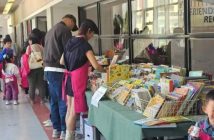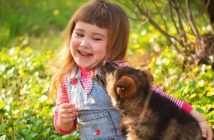
3e International School – 3e国际学校
Languages taught: Chinese, English
Age range: 2-9
Grade range: Nursery-Grade 3 (Grade 4 coming soon)
Method of teaching: 3e is a dual immersion program that aims to develop “critical thinkers and passionate learners who move confidently and fluidly across cultures,” through a specially developed, research-based curriculum. Classes are given in English and Chinese with half of the day devoted to each language. A balance of child-initiated and teacher-directed activity is provided to support children’s development across the entire curriculum.
Tips for parents:
Always maintain your home language; it is the language of your family and your culture.
Facilitate play dates with children who speak languages taught at your child’s school and at home.
Read, read, read, and talk, talk, talk!
“Taking the opportunity for the children to learn Mandarin was high on our list of priorities, but they have gained so much more than just a second language at 3e. Teachers gauge their students’ interests; they teach them to do their work and treat their friends with respect. The small class sizes and school campus have always made it a warm and welcoming place to be.”
–Clare Kitchen (UK), mother of Billy (7), Lila (6) and Scarlett (4)
“3e has created an environment that feels more like a home than a workplace. You always feel welcome. The staff is treated the way the students are treated, with dignity, respect and encouraged individuality. At 3e, we increase students’ abilities, bilingual language skills and worldly social skills in a fun, safe and comfortable environment that coincidentally, encourages the same type of behavior and development in its staff.”
–Charlie Nicholas, 3e International Grade 2/3 English teacher
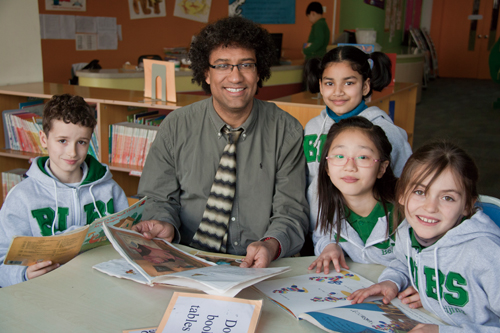
Beanstalk International Bilingual School (BIBS)
青苗国际双语学校
Languages taught: Chinese, English
Age range: 2-12
Grade range: Pre-K to Grade 5
Method of teaching: At the newly established Beanstalk Bilingual Kindergarten, 50 percent of the curriculum is taught in English and 50 percent in Chinese. The reading programs focus on whole and small group reading and discussion to ensure that children develop both oral and written language skills. BIBS’ primary school curriculum has been specifically designed by integrating the best of Eastern and Western educational philosophies and teaching methodologies.
Unique traits: All teachers are language teachers. Chinese language classes are differentiated by levels to allow students to progress steadily at their own pace, building a solid foundation at a speed that matches their language abilities. Students with native or near-native Chinese abilities will study the Chinese national curriculum for language arts and mathematics, using the same textbooks as their peers in Chinese public schools. Students who study Chinese as a second language follow a program specifically designed for them.
Additional services: In English classes, each grade has a language specialist for in-class support. This allows homeroom teachers to help native English speakers progress at the same rate they would in their home country while offering extra support to those with lower levels of English.
“One of the key things a parent can do for their child is to instill in them a sense that learning is a process to be explored and enjoyed, not worried about and feared. Parents should support their children and not pressure them. Effort needs to be continuously acknowledged and rewarded and often, as much if not more, than achievement.”
–Anoo Choudhuri, BIBS Primary Years Program (PYP ) coordinator

Beijing International Bilingual Academy (BIBA)
海嘉国际双语学校
Languages taught: Chinese, English
Age range: 2.5-15
Grade range: Nursery-Grade 8
Method of teaching: US national education standards are followed for most subjects including English, mathematics, social studies, science, music and PE. These are taught by native English-speaking teachers. Chinese national standards are followed for Chinese language arts and mathematics. Music, art, PE, drama, Spanish, and other electives are taught by native specialist teachers. English as a Second Language (ESL) and Chinese as a Second Language (CSL) classes are also provided at different levels.
Unique traits: BIBA accepts both foreigners and Chinese citizens. BIBA is also the host school for the International Piano Academy of China (IPAC). They have recently expanded their modern campus and facilities.
Tip for parents: The younger they are, the easier it is for children to absorb two or more languages simultaneously. For faster uptake of a second language, introduce your children to a bilingual education in their kindergarten years.
“We are grateful for the youth and vitality of the staff at BIBA. They have provided our daughters with teachers young enough to keep pace with the children, yet mature enough to lead them in thoughtful and directed study in which they maintain a high interest in the varied approaches to learning.”
–Dan Falding (US), father of Savannah and Shania (Grade 5)
“We chose BIBA because we wanted our children to improve their Chinese, yet still maintain their English and enjoy the variety afforded by an international school. Also, BIBA’s fee structure was competitively priced. Two and a half years later, our children are happy and progressing.”
–Darrell Barnes (UK), father of Jordan (11) and Tazmin (9)
“BIBA combines a challenging bilingual education in a close knit, family oriented environment. The students and staff at BIBA represent over 20 countries. This amalgamation of students and teachers makes BIBA highly conducive in preparing its students for a diverse world.”
–Michael Oehlschlaeger, BIBA English language arts instructor
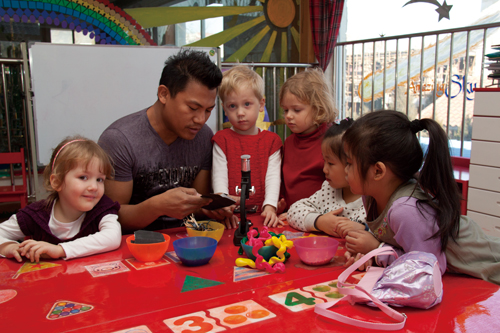
Children’s Learning Center of Beijing (CLCB)
爱嘉励儿童双语培训学校
Languages taught: Chinese, English
Age range: 18 months-6.5 years
Grade range: Nursery-Preparatory Class
Method of teaching: CLCB follows an American-based curriculum, which integrates various subjects to help active learners make sense of the complex dimensions of their world. The bilingual program is immersive, so children are exposed to both languages for an equal amount of time throughout the day.
Unique traits: A low teacher-to-student ratio allows for individual attention and ensures the quality of instruction.
Tips for parents:
- Talk to your child regularly to lay the foundation for his/her language and literacy development. Using the language in which you are most comfortable, have conversations that will promote your child’s thinking and language development.
- Try not mix up languages. When talking with your child in one
- Read with your child, no matter what language you read in. By learning to read in the stronger language, your child will build the skills needed to read in another language.
“We selected CLCB over other schools for their Chinese immersion program. They teach by speaking to children in 100 percent Chinese, which allows them to become bilingual instead of having a library of vocabulary words. This is extremely important to capture within the first five years of life when their brains are like sponges.”
–Charis and Jimmy Han (US/China), parents of Kylie (4) and Jase (1)
“Children are children and learning activities should be carefully planned based on their interests. They should enjoy the freedom to explore and learn that school life does not deprive them of their childhood.”
–Humphrey Agcaoili, kindergarten English teacher at CLCB

Daystar Academy 北京市朝阳区启明星双语学校
Languages taught: Chinese, English
Age range: 3-12
Grade range: Kindergarten-Grade 6
Method of teaching: Students spend half the day immersed in each language environment. For the English portion, they have a Montessori-based program mixed with other curricula. To teach Chinese, the school uses the Chinese national curriculum to help children develop memorization skills and an understanding of Chinese culture. As part of its curriculum, Daystar is developing an integrated, capabilities-based character education program that unites all areas of the school and community.
Unique traits: Daystar is locally-licensed, which means they accept Chinese nationals. As a result, their student body has a balance of foreigners and locals.
Tips for parents: Chinese homework requires a lot of daily help. If you do not speak Chinese, find a tutor or have an ayi assist with your child’s homework. Daystar can help parents find a tutor.
“We first got to know Daystar in 2007 [when after two years]our daughters’ Chinese had not developed as we’d hoped. So we made the switch [to Daystar]and have been very happy with the foundation our girls achieved in both languages. Our oldest, Zola, graduated in 2010 but our younger girl Bronte is still there. It’s been a very worthwhile experience.”
–Tom Grimmer, parent of Bronte (Grade 5)
“At Daystar, we offer a safe, encouraging and friendly environment to children. In the classroom, we build their knowledge and fundamental skills and pay more attention to the diversification in form. We make an effort to interact with students and and encourage them to engage in independent and cooperative learning. We also assist children with book selection and encourage reading at home.”
–Zhao Xuesong, Daystar Academy Chinese teacher

Eduwings Kindergarten 金翼德懿幼儿园
Languages taught: Chinese, English, German
Age range: 1-6
Method of teaching: All teachers are native speakers. Classes have a lead teacher as well as teaching assistants, so there is someone who speaks English, German and Chinese in the classroom at all times. Activities include games, songs, poems and the discussion of new topics to help students expand their vocabulary and learn about the world.
Unique traits: There are many themed rooms, such as the art room, the Montessori room, the music room, two piano rooms, a physical education room and a big library. There is also an outdoor playground, with plans for a swimming pool.
Additional services: Eduwings has a professional speech therapist who is bilingual in English and German.
“I think that each individual child needs to be understood, accepted and nurtured to grow. Only then can true language acquisition take place. If children feel pressured by parents or teachers to learn a language, they will only receive that pressure and the learning will come haltingly. Parents and teachers should try to have natural and open dialogue with [their]children. I always try to make learning a second language fun and rewarding!”
–Louis Bruchez (US), English teacher at Eduwings Kindergarten
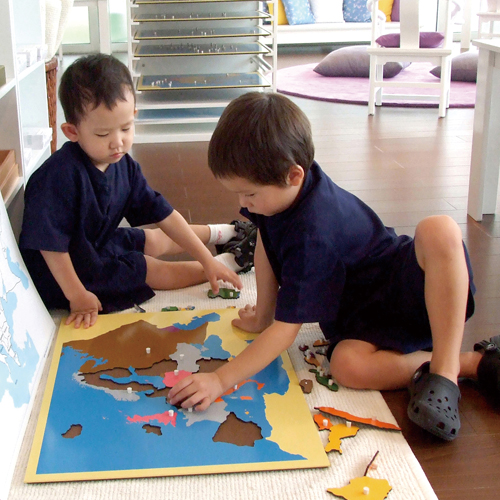
The Family Learning House (TFLH) 家育苑
Languages taught: Chinese, English
Age range: 18 months-6 years
Method of teaching: The Family Learning House is an educational community centered around a bilingual Montessori curriculum and enriched with the “Virtues in Us” character education program. Extracurricular highlights include daily art and music lessons (with individualized piano instruction), nutritious homemade lunches prepared daily in the school’s kitchen, educational outings around Beijing, and monthly cultural and topical learning themes.
Unique traits: Every child is celebrated and respected with individualized instructional plans, which are applied with a diverse and growing collection of teaching methods and learning materials designed to test and engage the child.
Tips for parents: A child’s home environment goes hand-in-hand with their education at school. Parents should keep this in mind as they consider ways to foster bilingualism at home.
“The Family Learning House is not just a kindergarten where you choose to enroll your child. Rather, you are choosing a learning community, committed to an approach to education that involves the whole family. The quality of character education, enhancing the Montessori environment and our rich programming, allows a deeper understanding and fosters a joy of learning in the children that attend our school.”
–Kate Millie (Canada), The Family Learning House academic director
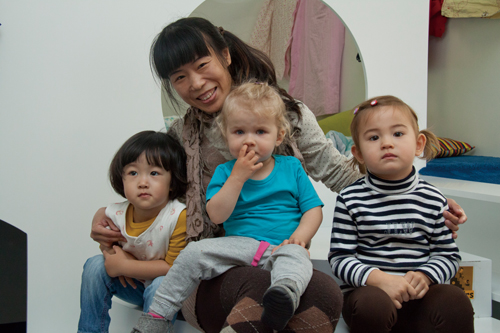
House of Knowledge International Kindergarten (HoK) 好思之家国际幼儿园
Languages taught: Chinese, English, German
Age range: 12 months-6 years
Grade range: Toddler-preschool
Method of teaching: In a trilingual, project-based setting, this kindergarten uses music, art, science, cultural events and more to stimulate the innate creativity and curiosity within each child. Once a child’s curiosity is piqued, qualified teachers and early childhood educators encourage and guide students – individually and as a group – to explore and learn new concepts using their environment and their own personal competencies.
Unique traits: HoK teachers are comprised of approximately 50 percent locals and 50 percent foreigners, and all speak only their native language in class. HoK accepts both local and expat children. This means that whether children are working with teachers or playing with fellow students, they are exposed to native speakers throughout the day and are able to learn English, Chinese and German in their purest forms. Additional services: Both HoK campuses have a certified speech therapist who works with all children in class, and is available to the general public for both child and adult consultations.
“My kids couldn’t speak any English or Chinese when we came to Beijing. We chose the trilingual HoK kindergarten so that they would feel safe knowing there is someone who speaks German and, at the same time, have the chance to get familiar with different languages and cultures. The teachers are all native speakers, who are very friendly and caring, so kids can easily connect. The school offers a good combination of learning, physical activities and playtime. And the best thing is [that]my kids look forward to going there every day.”
–Nora Mueller (Germany), mother of Emma (4) and Lisa (3)
“I love working at HoK. It is such a bright, happy environment, and it’s amazing to see how fast the children pick up new languages in our trilingual program. As teachers, we are given the freedom to do projects based on the children’s unique interests, which creates a fun and exciting learning environment!”
–Sarah Fenwick-Ross (New Zealand), HoK English preschool lead teacher

Ivy Bilingual School (IBS)
艾毅双语幼儿园
Languages taught: Chinese, English
Age range: 2-6
Grade range: Nursery-kindergarten
Method of teaching: Ivy Bilingual School offers an immersive bilingual program, where each classroom has a full time lead English teacher and a lead Chinese teacher. Both teachers interact with the children all day, every day, so that students receive exposure to both languages on a regular basis.
Unique traits: The school embraces the theory of Multiple Intelligences (MI), which means recognizing children as individuals and the learning process as a journey. A curriculum based on MI helps children and teachers see that everyone is intelligent and has their own strengths, experiences, and skill sets.
Additional services: After school classes are available in both English and Chinese.
Tips for parents:
- Practice is the most effective way to learn. Gently encouraging a child to communicate in their second language in a variety of settings can help build self-confidence, vocabulary and fluency.
- Keeping language learning as relaxed and natural as possible is also important.
- If parents don’t speak the second language in question, they can encourage their child to teach them and share the learning experience.
“We enrolled our first child at Ivy Bilingual because we happened to live in the same compound when we moved to Beijing. Three of my four children have attended IBS and they all love the school. We value the combination of a Western approach to early childhood development and education with Chinese language and culture. Creativity and exploration, as well as learning through playing and experimenting are very important to us. At Ivy Bilingual, we found all of these features in an English-Chinese language environment.”
–Ulrike Gemmer (Germany), mother of Ole, Malte, and Nele
“As a teacher at Ivy, I have great support from the school to be creative and to make the learning process a very natural and inspiring journey for the children. Tapping into various forms of intelligence, we tailor the curriculum to each individual child. students are encouraged to take the lead in the classroom as we provide an opportunity for them to explore their environment, allowing what they are interested in to become the topic of the lesson.”
–Ako Rashidah (Singapore), IBS English pre-kindergarten teacher
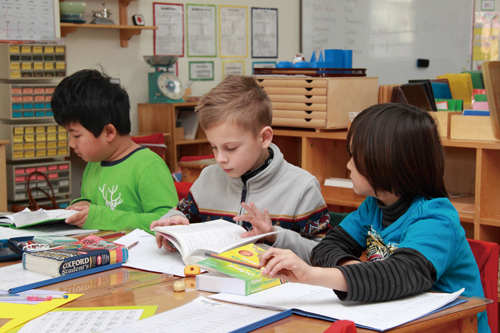
The International Montessori School of Beijing (MSB) 北京蒙台梭利国际学校
Languages taught: Chinese, English
Age range: 2-12
Grade range: Nursery-Grade 6
Method of teaching: MSB offers both an English-language Montessori curriculum as well as a dual language immersion program that incorporates Chinese language, traditional literature and culture. Both options are full Montessori academic programs.
Additional services: English as an Additional Language (EAL) is offered and after school tutoring services can be arranged.
Tips for parents:
- Develop friendships with native speakers.
- Show enthusiasm for new languages yourself.
- Hire babysitters who speak the language you are learning.
- Listen to audiobooks and watch movies.
- Becoming fluent in a language involves affective learning, or the ability to express feelings through attitudes, appreciations, and values. Do these things to help your child develop a well-rounded appreciation for the language and culture.
“The majority of our teaching staff is trained in the Montessori method of education. We come from a variety of countries and educational backgrounds, but we share a common understanding of the importance of observing children, in order to facilitate their social, emotional and educational needs. Our ultimate objectives are to guide children towards reaching their fullest potential, helping them to develop a sense of self, and a deep respect and appreciation for their world, environment and fellow human beings.”
–Noelle Ward (Ireland), MSB reception teacher
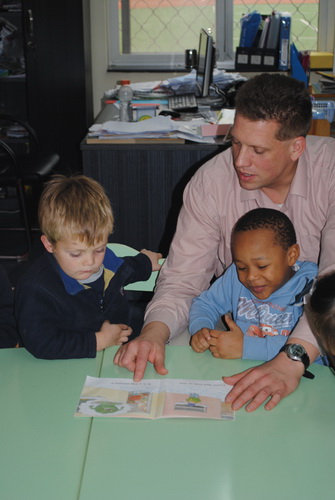
Springboard International Bilingual School (SIBS) 君诚国际双语学校
Languages taught: Chinese, English
Age range: Kindergarten-Grade 5
Method of teaching: The school teaches in English for 75 percent of the week and in Chinese for the rest. The English-only after school activities take place twice a week, at no extra cost.
Additional services: Because SIBS accepts both local and expat students, the school offers advanced Chinese lessons three days a week as an after school class. English as a Second Language (ESL) is available to students who need additional support.
Tips for parents: Look for small class sizes the school of your choice – a key factor in success of learning.
“We chose this school because of the small class sizes, the friendliness of the staff, and the diversity of the student body. Both our children come home with smiles on their faces and share stories about how much fun they are having with their schoolmates and teachers. We feel that they are in a safe and caring environment that is also providing a high quality, well-rounded education.”
–Sofia Fleck (US), mother of Lucia (Grade 1) and Jack (kindergarten)
“Every child matters at SIBS. It is a small, secure, and warm school that really lets both international and Chinese pupils mix together and develop into responsible, culturally-aware young people.”
–Harry Brookfield (UK), SIBS Grade 5 teacher

Yew Chung International School of Beijing (YCIS Beijing) 北京耀中国际学校
Languages taught: Chinese, English
Age range: 2-18
Grade range: Kindergarten-Year 13
Method of teaching: Early childhood to Year 6 classes are taught by experienced co-teachers (one native English speaker and one native Chinese speaker). Students in Year 1 to Year 3 have two violin classes a week, as studies show that music lessons at an early age supports linguistic development – especially for tonal languages like Mandarin. All students have access to YCIS Beijing’s online Chinese learning platform and English language support teachers.
Unique traits: All students from kindergarten to secondary school (ages 2-18) are enrolled in Chinese language programs, with levels varying from beginner to native. The school even offers traditional Chinese courses. In secondary school, Year 12 and Year 13 students follow the International Baccalaureate Diploma Programme (IBDP ). In the past, several graduates have achieved bilingual diplomas.
Additional services: All grades have cultural immersion programs integrated with student learning, including explorations of the daily lives of locals, “Exploring Beijing” field trips, and travels within China for older students.
Tips for parents:
- Research the school and take a tour of each campus. Many preschools offer bilingual programs, but when it comes to primary and secondary schools, the options are more limited.
- Ask questions about the development of the Chinese language program and experience of Chinese teachers at your child’s prospective school.
“To be a globally-aware student, you need a skill set. YCIS Beijing does an excellent job of promoting bilingualism in English and Chinese. We wanted to give our bilingual children a solid Chinese foundation, and out of all the international schools, I knew that YCIS Beijing had the strongest Chinese program with a two-track system of CAL (Chinese as an Additional Language) and CFL (Chinese as a First Language) that could teach to their level as they advanced.”
–Katie Hoskin, (US), mother of Sydney (16), Jade (14) James (10), Kaia (10), and Kendyl (8)
“English and Mandarin are two of the most spoken languages in the world, and through co-teaching, our students are immersed daily in a bilingual environment that fosters 21st century learning. My co-teacher and I each bring our strengths to the classroom in order to provide our students with individualized attention, [modeling]the importance of respecting different cultures, and [guiding]them to a path as global citizens.”
–Heather Davis (Canada), YCIS Beijing primary school co-teacher
This article is excerpted from beijingkids 2012-2013 School Choice Guide. View it in PDF form here or contact distribution@beijing-kids.com to find out where you can pick up your free copy.

